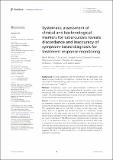Systematic assessment of clinical and bacteriological markers for tuberculosis reveals discordance and inaccuracy of symptom-based diagnosis for treatment response monitoring
Abstract
Background : Clinical symptoms are the benchmark of tuberculosis (TB) diagnosis and monitoring of treatment response but is not clear how they relate to TB bacteriology, particularly the novel tuberculosis Molecular Bacterial Load Assay (TB-MBLA). Methods : Presumptive cases were bacteriologically confirmed for TB and assessed for symptom and bacteriological resolution using smear microscopy (SM), culture and TB-MBLA over 6-month treatment course. Kaplan Meier and Kappa statistics were used to test relationship between symptom- and bacteriological-positivity. Results : A cohort of 46 bacteriologically confirmed TB cases were analysed for treatment response over a six-month treatment course. Pre-treatment symptom and bacteriological positivity concurred in over 70% of the cases. This agreement was lost in over 50% of cases whose chest pain, night sweat, and loss of appetite had resolved by week 2 of treatment. Cough resolved at a 3.2% rate weekly and was 0.3% slower than the combined bacteriological (average of MGIT and TB-MBLA positivity) resolution rate, 3.5% per week. Drop in TB-MBLA positivity reflected fall in bacillary load, 5.7±1.3- at baseline to 0.30±1.0- log10 eCFU/mL at month 6, and closer to cough resolution than other bacteriological measures, accounting for the only one bacteriologically positive case out of seven still coughing at month 6. Low baseline bacillary load patients were more likely to be bacteriologically negative, HR 5.6, p=0.003 and, HR 3.2, p=0.014 by month-2 and 6 of treatment respectively. Conclusion : The probability of clinical symptoms reflecting bacteriological positivity weakens as patient progresses on anti-TB therapy, making symptom-based diagnosis a less reliable marker of treatment response.
Citation
Mtafya , B A , Sabi , I , John , J , Sichone , E , Olomi , W , Gillespie , S H , Ntinginya , N E & Sabiiti , W 2022 , ' Systematic assessment of clinical and bacteriological markers for tuberculosis reveals discordance and inaccuracy of symptom-based diagnosis for treatment response monitoring ' , Frontiers in Medicine , vol. 9 , 992451 . https://doi.org/10.3389/fmed.2022.992451
Publication
Frontiers in Medicine
Status
Peer reviewed
ISSN
2296-858XType
Journal article
Description
Funding: This work was supported by Commonwealth PhD studentship award to Dr Bariki Mtafya (Award number: TZS-2016-718) at University of St Andrews and European and Developing Countries Clinical Trials Partnership through TWENDE project (grant number; TWENDE-EDCTP-CSA-2014-283) and PanACEA II (grant number; 97118-PanACEA-TRIA.2015.1102) awarded to Professor Stephen Gillespie and Dr Wilber Sabiiti at the University of St Andrews, UK.Collections
Items in the St Andrews Research Repository are protected by copyright, with all rights reserved, unless otherwise indicated.

